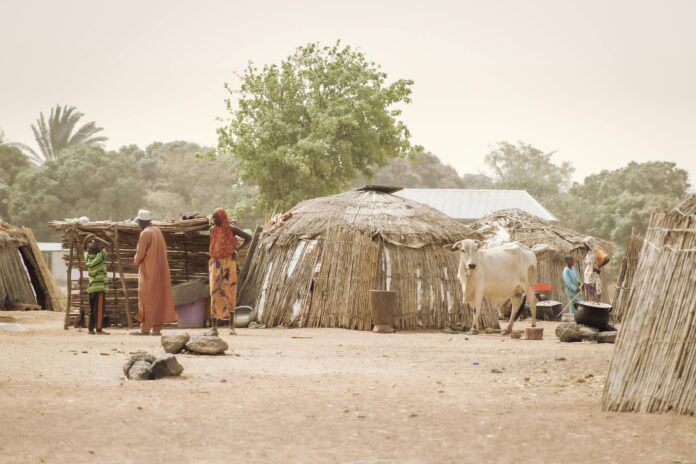Evelyn Dan Epelle, San Jose, California
ADIS24 – Africa stands at the forefront of climate change impacts, despite its low contribution to greenhouse gas emissions. Africa remains the most vulnerable continent to climate change impacts, facing increasingly frequent and severe droughts, floods, and other extreme weather events. These challenges pose significant threats to food security, healthcare, housing, and overall development across the continent. Amidst these adversities, there lies an opportunity for resilience and innovation.
The African Development Bank (AfDB) estimates that Africa will need investments of over 3 trillion US Dollars by 2030 to mitigate and adapt to the adverse impacts of climate change. Despite the grim reality of risks and expenses for underserved communities in Africa, the biggest threat to achieving climate justice for Africa is simply inaction. (Baobab Linkedin Whitepaper, December 2022).
Climate change stakeholders from Africa and across the African diaspora have initiated activity to deliberate on sustainable agricultural practices and offer a pathway towards climate adaptation while simultaneously addressing food security and fostering development in Africa. The African Diaspora Investment Symposium (ADIS24) convening in Silicon Valley is a signature initiative of the Africa Diaspora Network (ADN) that underscores the urgent need to address climate change collaboratively by bringing together change-makers, innovators, and advocates to explore sustainable solutions and create a prosperous and green future for the continent, under the theme, “Activate With Africa: Climate Change, Connections, And Action”. Discussions at ADIS24 will center on diaspora engagement, innovation, investment, the African Union’s Agenda 2063, Africa-led climate solutions, and more.
A pathway towards climate adaptation, food security and development
Across the continent, governments, NGOs, and local communities are actively engaging in climate adaptation initiatives to mitigate the impacts of a changing climate. These efforts encompass a wide range of strategies, including water conservation, afforestation, and the promotion of sustainable agricultural practices. One notable example is the Great Green Wall initiative, spanning 20 countries from Senegal to Djibouti. This ambitious project aims to combat desertification by planting a belt of trees across the Sahel region, providing a natural barrier against encroaching desertification and creating opportunities for sustainable agriculture.
Similarly, in Eastern Africa, initiatives like the Climate Smart Agriculture (CSA) approach are gaining traction. CSA emphasizes the integration of climate-resilient practices such as conservation agriculture, agroforestry, and improved water management techniques. These practices not only enhance the resilience of farming systems but also contribute to carbon sequestration and biodiversity conservation. Conversations about climate adaptation and the associated economic impact for African Agriculture and food systems creates a pathway towards the guaranteeing food security for all.
Integrating Sustainable Agricultural Practices for Food Security and Development
Healthy soils are essential for productive agriculture, yet many African soils suffer from degradation due to erosion, nutrient depletion, and improper land management practices. Sustainable agriculture lies at the heart of the broader objective of achieving food security and development in Africa.
By promoting practices that enhance soil health, conserve water, and minimize greenhouse gas emissions, sustainable agriculture can simultaneously address the challenges of climate change while boosting agricultural productivity and livelihoods. Sustainable agriculture promotes techniques such as conservation tillage, crop rotation, and the use of organic fertilizers to improve soil health and fertility. By maintaining soil structure and fertility, farmers can better withstand the impacts of climate variability and achieve higher crop yields.
Water scarcity is also a growing concern in many parts of Africa, exacerbated by climate change and population growth. Sustainable agricultural practices such as rainwater harvesting, drip irrigation, and agroforestry help farmers optimize water use efficiency and mitigate the risks of drought. By conserving water resources and improving irrigation techniques, farmers can sustainably increase agricultural productivity even in arid and semi-arid regions. Monocropping and reliance on a limited number of crops make farming systems vulnerable to climate shocks and pests. Sustainable agriculture promotes diversification through agroecological principles, including intercropping, polyculture, and integration of livestock. Diverse cropping systems enhance resilience to climate variability, reduce pest pressure, and improve ecosystem services such as pollination and soil fertility.
Conclusion
In the face of climate change and growing food insecurity, sustainable agriculture emerges as a beacon of hope for Africa’s future. By integrating climate adaptation efforts with sustainable agricultural practices, the continent can build resilience, enhance food security, and foster inclusive development. Ensuring access to markets and appropriate technologies is crucial for the success of sustainable agriculture initiatives. Governments and development organizations can support smallholder farmers by providing access to markets, financial services, and affordable technologies such as drought-resistant seeds, weather forecasting tools, and renewable energy solutions.
Achieving these goals will require concerted efforts from governments, civil society, and the private sector to prioritize investments in sustainable agriculture. By empowering smallholder farmers with the necessary resources and knowledge, sustainable agriculture can catalyze rural development and poverty alleviation. Only through collective action and innovation can Africa cultivate resilience and thrive in a changing climate.
—
Evelyn Dan Epelle participated in the 2023 African Diaspora Investment Symposium (ADIS23) as a Media Fellow. Register to attend ADIS24 and connect with Evelyn and other business leaders, scholars, fellows, and visionary entrepreneurs from various corners of the African continent and USA.










